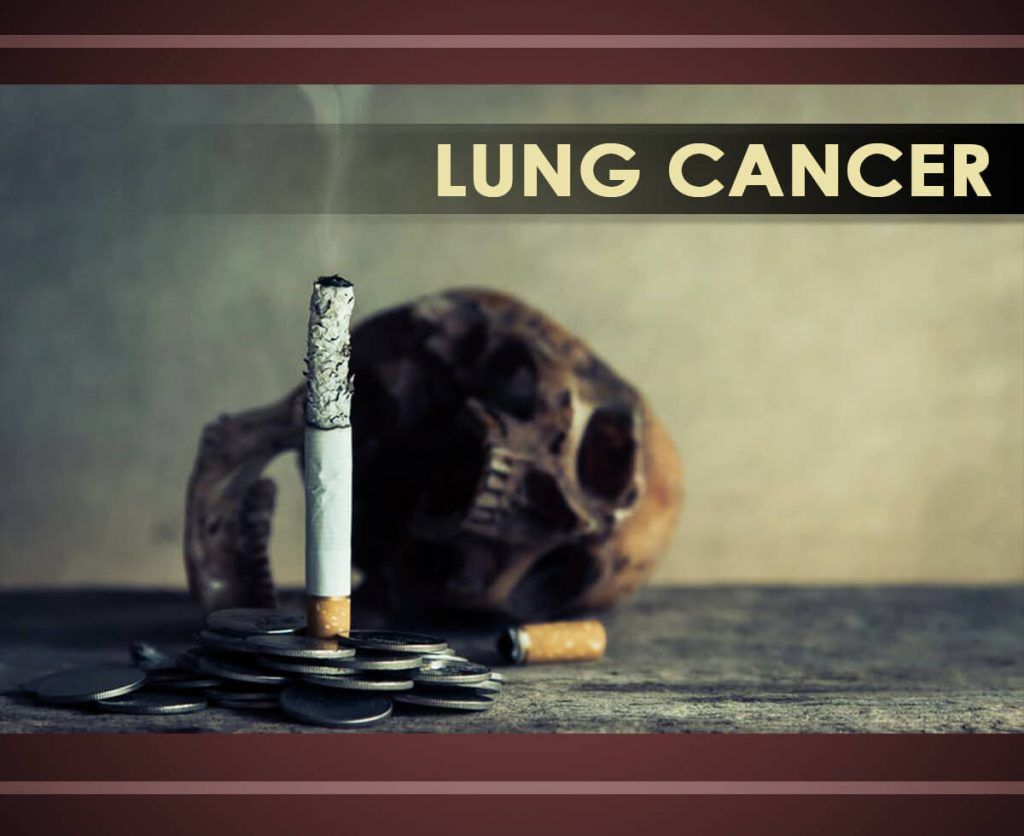LUNG CANCER

Lung cancer is a condition in which cells grow uncontrollably. It starts in the lungs and can invade other organs in the body, like the brain. Cancer from other organs may affect the lungs. When cancer cells invade from one organ to another, it is called “Metastases”.
Lung cancer is the most leading cause of death among men and women. Smoking of cigarettes is the number one factor that causes lung cancer. People, who smoke have a higher risk of developing this disease.
CAUSES OF LUNG CANCER
Smoking is the main cause of this disease. Smoker and secondhand smoker, have a risk of developing this condition. Other cause of cancer may be:
- Genetics
- Family History
- Personal History of Lung Cancer
SIGNS AND SYMPTOMS OF LUNG CANCER
The signs and symptoms of cancer include:
- Raspy Coughing
- Chest Pain
- Short Breathing
- Coughing up Blood
- Wheezing
- Fatigue
- Unexplained Weight Loss
- Hoarseness
- Pain and Weakness
- Loss of Appetite
LUNG CANCER RISK FACTORS
The following are the risk factors for developing cancer such as:
- Cigarette Smoking
- Secondhand Smoker
- Exposure to Radon Gas
- Exposure to Asbestos and Other Substances
- Family History of Lung Cancer
- Having a Radiation Therapy to the Chest
- Having a Lung Disease
- Air Pollution
HOW TO REDUCE THE RISK
The following are tips to help you reduce your risk of Lung cancer:
- Avoid Smoking.
- Stay away to people who smoke.
- Check your home for Radon.
- Be careful in places you go.
- Be careful and aware at Work.
- Limit your Alcohol intake.
HOW TO PREVENT LUNG CANCER
Having cancer has no sure way to prevent in getting the disease. But you can have your ways to help reduce your risk. Remember that, prevention is better than cure.
These are the following tips:
- Don’t Smoke.
- Quit Smoking.
- Avoid secondhand smoke.
- Test your home for certain radon.
- Be careful of Chemical that you use at home.
- Avoid carcinogens at work.
- Enjoy a cup of Green Tea.
- Eat plenty of Fruits and Vegetables.
- Exercise every day.
- Be aware of supplements that you take.
TREATING LUNG CANCER
The treatment of this condition may vary depending upon the following:
- Type of disease you have.
- The stage.
- How cancer spread in your body.
- The side effect that it may cause.
- Your age and health condition.
- And, your goals after treatment.
After your doctor has done the above-said plan. You may undergo treatment options such as:
- Surgery
- Ablation
- Radiation Therapy
- Chemotherapy
- Radiosurgery
- Targeted Drug Therapy
- Immunotherapy
- Palliative Care
MEDICATION USED FOR LUNG CANCER
There are other treatments to help in treating your condition. Such as the prescribed medication and alternative medicine.
Some prescribed medicines for Lung Cancer:
- Alectinib (Alecensa)
- Afatinib (Gilotrib)
- Avastin (Bevacizumab)
- Erlotinib ( Tarceva)
- Gefitinib ( Iressa)
- Trametinib (Mekanist)
ALTERNATIVE MEDICINE FOR CANCER:
- Acupuncture
- Hypnosis
- Massage
- Meditation
- Yoga



